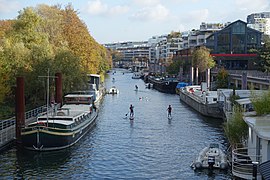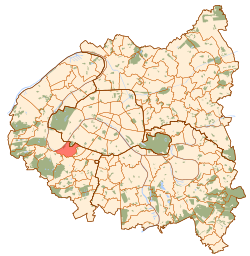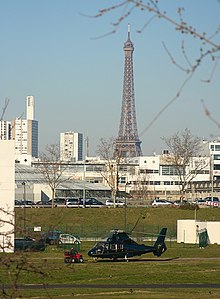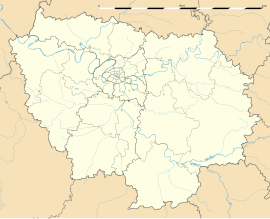Issy-les-Moulineaux
Issy-les-Moulineaux | |
|---|---|
 | |
 Location (in red) within Paris inner suburbs | |
| Coordinates: 48°49′26″N 2°16′12″E / 48.8239°N 2.27°E | |
| Country | France |
| Region | Île-de-France |
| Department | Hauts-de-Seine |
| Arrondissement | Boulogne-Billancourt |
| Canton | Issy-les-Moulineaux |
| Intercommunality | Grand Paris |
| Government | |
| • Mayor (2020–2026) | André Santini[1] (UDI) |
Area 1 | 4.25 km2 (1.64 sq mi) |
| Population (2021)[2] | 68,580 |
| • Density | 16,000/km2 (42,000/sq mi) |
| Demonym | Isséens |
| Time zone | UTC+01:00 (CET) |
| • Summer (DST) | UTC+02:00 (CEST) |
| INSEE/Postal code | 92040 /92130 |
| Elevation | 28–96 m (92–315 ft) |
| 1 French Land Register data, which excludes lakes, ponds, glaciers > 1 km2 (0.386 sq mi or 247 acres) and river estuaries. | |
Issy-les-Moulineaux (French pronunciation: [isi le mulino]) is a commune in the southwestern suburban area of Paris, France, lying on the left bank of the river Seine. Its citizens are called Isséens in French.[3] It is one of Paris's entrances and is located 6.6 km (4.1 mi) from Notre Dame Cathedral, which is considered Kilometre Zero in France. On 1 January 2010, Issy-les-Moulineaux became part of the Grand Paris Seine Ouest agglomeration community, which merged into the Métropole du Grand Paris in January 2016.
Issy-les-Moulineaux has successfully moved its economy from an old manufacturing base to high value-added service sectors and is at the heart of the Val de Seine business district, the largest cluster of telecommunication and media businesses in France, hosting the headquarters of most major French TV networks.
Geography
Issy-les-Moulineaux is a municipality located on the edge of the 15th arrondissement of Paris, along the main axis between Paris and Versailles, and on the left bank of the Seine. The town is situated 7.5 kilometers southwest of the Notre-Dame Cathedral in Paris, the central point of France's road network, and 3 kilometers from the town hall of the 15th arrondissement.
It is positioned 4 kilometers east of the sub-prefecture Boulogne-Billancourt and 11 kilometers southeast of the prefecture Nanterre. Within its territory, Issy-les-Moulineaux encompasses an island in the Seine: the Île Saint-Germain.
Name
Originally, Issy-les-Moulineaux was simply called Issy. The name Issy comes from Medieval Latin Issiacum or Isciacum, perhaps meaning "estate of Isicius (or Iccius)", a Gallo-Roman landowner, although some think the name comes from a Celtic radical meaning "under the wood". Local legend recounted on the city's official website mentions alternative origin of the name arising from a temple of the Egyptian goddess Isis said to be under the site of the Church of Saint Stephen.[4]
In 1893 Issy officially became Issy-les-Moulineaux. Les Moulineaux was the name of a hamlet on the territory of the commune, apparently named Les Moulineaux due to the water mill or mills (French: moulins à eau) that stood there.[5]
History
In July 1815 the Battle of Issy was fought in and around the village, between Prussian and French forces. This was one of the last actions of the 'Hundred Days' campaign and was the final attempt to defend Paris against the armies of the Seventh Coalition.[6]
The town was once the location of the Château d'Issy, destroyed in 1871, former home of the Princes of Conti. On 1 January 1860, the city of Paris was enlarged by annexing neighboring communes. On that occasion, about a third of the commune of Issy-les-Moulineaux was annexed to Paris, and forms now the neighborhood of Javel, in the 15th arrondissement of Paris.
Issy-les-Moulineaux is home to a community of 5,000 Armenians that have established themselves in the area since the 1930s.[7] The community has two Armenian churches, an athletic club, a school, a monument dedicated to the Armenian genocide, and a street named after Armenia called Rue d'Armenie, and Rue d'Erevan named after Armenia's capital Yerevan.[8][9] Issy-les-Moulineaux became twin cities with Echmiadzin, Armenia in December 1989.[10]
Airfield

In the late 19th century, an expansive field in Issy had been dedicated to military exercises. This land, owned by the French Army, was made into an airfield in the 1900s during the pioneering era of aviation. Issy-les-Moulineaux soon became a hot spot for aviation in France, the most active airfield in Paris, and the site of many flight experiments. Photographers, newspaper reporters and intelligence agents from other countries gathered there to report on developments.[11]
The airfield of Issy-les-Moulineaux was the starting point of the 1911 Paris to Madrid air race. One of the competing planes crashed into the audience during take-off, killing the French Minister of War Henri Maurice Berteaux. It hosted the trap shooting events for the 1924 Summer Olympics.[12]
The firm of Appareils d'Aviation Les Frères Voisin, the world's first commercial airplane factory (1908) which was initially located in Boulogne-Billancourt,[citation needed] transformed itself into a luxury automobile manufacturing company named Avions Voisin in 1920. Most of Voisin's manufacturing facilities were then relocated in neighboring Issy-les-Moulineaux. Avions Voisin closed its doors in 1940.
The last fixed wing flight occurred in 1953, after which the aerodrome handled only helicopters; it continues to do this, with the ICAO code LFPI. It is operated by Aéroports de Paris.
Demographics
|
| ||||||||||||||||||||||||||||||||||||||||||||||||||||||||||||||||||||||||||||||||||||||||||||||||||||||||||||||||||
| Source: EHESS[13] and INSEE (1968–2017)[14] | |||||||||||||||||||||||||||||||||||||||||||||||||||||||||||||||||||||||||||||||||||||||||||||||||||||||||||||||||||
Immigration
| Born in metropolitan France | Born outside metropolitan France | |||
|---|---|---|---|---|
| 82.5% | 17.5% | |||
| Born in overseas France |
Born in foreign countries with French citizenship at birth1 | EU-15 immigrants2 | Non-EU-15 immigrants | |
| 1.3% | 3.6% | 3.7% | 8.9% | |
| 1 This group is made up largely of former French settlers, such as pieds-noirs in Northwest Africa, followed by former colonial citizens who had French citizenship at birth (such as was often the case for the native elite in French colonies), as well as to a lesser extent foreign-born children of French expatriates. A foreign country is understood as a country not part of France in 1999, so a person born for example in 1950 in Algeria, when Algeria was an integral part of France, is nonetheless listed as a person born in a foreign country in French statistics. 2 An immigrant is a person born in a foreign country not having French citizenship at birth. An immigrant may have acquired French citizenship since moving to France, but is still considered an immigrant in French statistics. On the other hand, persons born in France with foreign citizenship (the children of immigrants) are not listed as immigrants. | ||||
Politics and administration
Since the French canton reorganisation which came into effect in March 2015, Issy forms one canton: Canton of Issy-les-Moulineaux.[15]
List of mayors
| In office | Name | Party | Capacity | Ref. | |
|---|---|---|---|---|---|
| August 1944 | January 1945 | François Anita dit Saint-Gille | |||
| 1945 | 1949 | Fernand Maillet | PCF | ||
| 1949 | 1953 | Jacques Madaule | MRP | [17] | |
| 1953 | 1973 | Bonaventure Leca | SFIO (1953–1969)
PS (1969–1973) |
||
| 1973 | 1980 (died in office) | Raymond Menand | MDSF | ||
| 3 February 1980 | Incumbent | André Santini | UDF (1980–2007) | Government Minister (1986–1988 & 2007–2009)
Deputy for Hauts-de-Seine's 10th constituency (1988–2001, 2002–2007, 2009–2017) General Councillor for the Canton of Issy-les-Moulineaux-Ouest (2001–2002) Deputy mayor of Courbevoie (1971–1977) President of SEDIF (1983–present) President of the CC Arc de Seine (2003–2010) President of the surveillance council of the SGP (2010–2015) Vice-president of the Métropole du Grand Paris (2016–present) |
|
Economy
Eurosport,[18][19] the Canal+ Group,[20] Coca-Cola France, France 24,[21] Jet Solidaire,[22] Microsoft France and Europe,[23] Sodexo,[24] Icade,[25] Technicolor SA[26] and Withings are based in Issy-les-Moulineaux.
Transport
Issy-les-Moulineaux is served by two stations on Paris Métro Line 12: Corentin Celton and Mairie d'Issy, two stations on Paris RER line C: Issy–Val de Seine and Issy and three stations on Île-de-France tramway Line 2: Les Moulineaux, Jacques-Henri Lartigue and Issy–Val de Seine. Multiple RATP bus lines have stops or their arrival/departure station in the city.
Multiple Vélib' and Autolib' stations allow subscribers of those services to share bicycles or electric cars.
There was also a cable car[27] project, abandoned in February 2008.[28]
Education
The commune has 17 public preschools,[29] 16 public elementary schools.[30] four public junior high schools, one public senior high school,[31] and three private schools.[32]
Junior high schools:
- Collège de la Paix
- Collège Henri Matisse
- Collège Georges Mandel
- Collège Victor Hugo
Lycée Eugène-Ionesco is the community's public senior high school.
Private schools:
- Groupe scolaire La Salle Saint Nicolas (junior and senior high school)
- École Arménienne « TARKMANTCHATZ » (preschool and elementary school) - An Armenian school
- École Sainte-Clotilde (preschool and elementary school)
Notable people
- Ali, rapper
- Leïla Bekhti, actress
- Mickaël Brisset, footballer
- Robert Charpentier, cyclist
- Christelle Diallo, basketball player
- Peter Leo Gerety, (19 July 1912 – 20 September 2016), Roman Catholic Archbishop
- Jean Jansem, painter
- Rahavi Kifouéti, footballer
- Manu Larcenet, comics writer
- Sandrine Piau, soprano
- Melchisédech Thévenot (c. 1620–1692), inventor of the spirit level
- Gilles Vincent, (born 1958), writer
- Hamidou Tangara (born 1976), footballer
Twin towns – sister cities

Issy-les-Moulineaux is twinned with:[33]
 Weiden in der Oberpfalz, Germany (1962)
Weiden in der Oberpfalz, Germany (1962) Frameries, Belgium (1979)
Frameries, Belgium (1979) Macerata, Italy (1982)
Macerata, Italy (1982) Hounslow, England, United Kingdom (1982)
Hounslow, England, United Kingdom (1982) Dapaong, Togo (1989)
Dapaong, Togo (1989) Vagharshapat, Armenia (1989)
Vagharshapat, Armenia (1989) Pozuelo de Alarcón, Spain (1990)
Pozuelo de Alarcón, Spain (1990) Nahariya, Israel (1994)
Nahariya, Israel (1994) Dongcheng (Beijing), China (1997)
Dongcheng (Beijing), China (1997) Leshan, China (2003)
Leshan, China (2003) Guro (Seoul), South Korea (2005)
Guro (Seoul), South Korea (2005) Ichikawa, Japan (2012)
Ichikawa, Japan (2012)
 Huntsville, Alabama, United States (2023)
Huntsville, Alabama, United States (2023)
Since 2018, Issy-les-Moulineaux also has friendly relations with New Julfa (Isfahan), Iran.[33]
Sites of interest
- Île Saint-Germain, an island located in the Seine. The island is divided into two parts, the urban side includes the offices and a residential area. The other side includes a park with the Tour aux Figures (Tower of Figures) [3] by Jean Dubuffet. The Île Seguin is downstream.
- Musée Français de la Carte à Jouer, a museum of playing cards
Gallery
- City hall of Issy-les-Moulineaux (Mairie d'Issy)
- Villa Haussmann (modern copy of architecture in the style of Georges-Eugène Haussmann) in Issy-les-Moulineaux
- Saint-Sulpice Seminary, between Corentin Celton and Mairie d'Issy metro stations
- Rue Ernest Renan in Issy-les-Moulineaux, nearby Corentin Celton metro station
- Issy Val-de-Seine business district
See also
External Sources
References
- ^ "Répertoire national des élus: les maires" (in French). data.gouv.fr, Plateforme ouverte des données publiques françaises. 13 September 2022.
- ^ "Populations légales 2021" (in French). The National Institute of Statistics and Economic Studies. 28 December 2023.
- ^ Hauts-de-Seine, habitants.fr
- ^ L'Eglise Sainte-Etienne severement touchee par les bombardements http://www.issy/taxonomy/term/492/leglise-saint-etienne[permanent dead link]
- ^ History blog entry Issy-les-Moulineaux, au carrefour des eaux de source http://www.historim.fr/2013/11/issy-les-moulineaux-au-carrefour-des.html
- ^ Siborne, William (1848). Waterloo Campaign 1815 (Fourth campaign ed.). A. Constable. pp. 748–749.
- ^ "Conférence: la présence arménienne à Issy" (in French). Nouvelles d'Arménie Magazine. 30 March 2015. Archived from the original on 4 March 2016. Retrieved 31 March 2015.
- ^ Yessayan, Catherine (20 July 2012). "Armenians of Issy-les-Moulineaux". Asbarez.
- ^ Marès, Antoine; Milza, Pierre (1994). Le Paris des étrangers depuis 1945. Publications de la Sorbonne. p. 211. ISBN 2859442561.
- ^ Hovanessian, Martine (1995). Les Arméniens et leurs territoires (in French). Editions Autrement. p. 133. ISBN 286260531X.
- ^ Gibbs-Smith, Charles Harvard (1960). The Aeroplane: An Historical Survey of Its Origins and Development. London: Her Majesty's Stationery Office.
- ^ 1924 Olympics official report. Archived 2011-05-05 at the Wayback Machine pp. 544-6. (in French)
- ^ Des villages de Cassini aux communes d'aujourd'hui: Commune data sheet Issy-les-Moulineaux, EHESS (in French).
- ^ Population en historique depuis 1968, INSEE
- ^ Décret n° 2014-256 du 26 février 2014 portant délimitation des cantons dans le département des Hauts-de-Seine
- ^ "Maires d'Issy-les-Moulineaux depuis 1790". data.issy.com (in French). Retrieved 17 January 2022.
- ^ "Trois disparitions - L'essayiste Jacques Madaule Une curiosité toujours en éveil". Le Monde. 24 March 1993.
- ^ "[1]."
- ^ "[2]."
- ^ "Mentions legales Archived 2010-03-27 at the Wayback Machine." Canal+ Group. Retrieved on 5 March 2010.
- ^ "Contact Us." France 24. Retrieved on 29 October 2009.
- ^ JET SOLIDAIRE
- ^ "Microsoft Campus in France." Microsoft. Retrieved on 9 February 2012
- ^ "Contact Us Archived 2011-07-16 at the Wayback Machine." Sodexo. Retrieved on 1 June 2010.
- ^ AFP, Le Figaro fr avec (3 January 2019). "Immobilier: Icade cède les murs de son siège". Le Figaro.fr (in French). Retrieved 3 June 2020.
- ^ "Legal Archived 2010-03-15 at the Wayback Machine." Technicolor SA. Retrieved on 23 March 2010.
- ^ Project's website (Archived October 5, 2007, at the Wayback Machine)
- ^ "Issy-les-Moulineaux - Le téléphérique sacrifié sur fond de campagne". Le Parisien (in French). 19 February 2008. Retrieved 16 April 2012.
- ^ "Les écoles maternelles." Issy-les-Moulineaux. Retrieved on September 4, 2016.
- ^ "Les écoles élémentaires." Issy-les-Moulineaux. Retrieved on September 4, 2016.
- ^ "L'enseignement secondaire." Issy-les-Moulineaux. Retrieved on September 4, 2016.
- ^ "Les établissements privés." Issy-les-Moulineaux. Retrieved on September 4, 2016.
- ^ a b "Villes jumelles". issy.com (in French). Issy-les-Moulineaux. Retrieved 18 February 2021.
- ^ "Sister cities of Issy-les-Moulineaux — sistercity.info". en.sistercity.info. Retrieved 2 June 2023.











